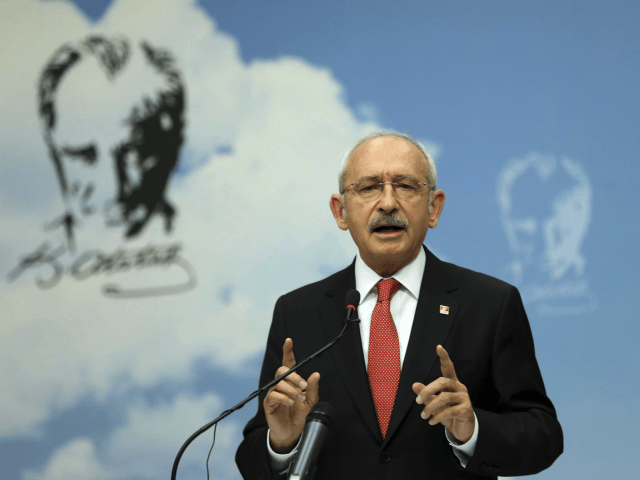In remarks Tuesday, Turkish secular opposition leader Kemal Kılıçdaroğlu refused to congratulate President Recep Tayyip Erdoğan on his election victory Sunday, asking “congratulations for what?” and insisting that “one does not congratulate a dictator.”
Kılıçdaroğlu’s party, whose candidate Muharrem İnce came in second place in the election, is facing internal restlessness following the party’s inability to defeated Erdoğan and expands its presence in the Turkish Parliament. The Republican People’s Party (CHP), a secular member party of the Socialist International, fared worse in this week’s election than İnce himself, prompting internal calls for Kılıçdaroğlu to allow someone else a chance to run the party.
Erdoğan won with little more than half of the votes in Sunday’s election, and his Islamist Justice and Development Party (AKP) saw its percent of control of the parliament drop by seven points, though it retained control of the government through a partnership with the Nationalist Movement Party (MHP).
The election was marred by widespread fraud allegations, the expulsion and harassment of independent observers, and a near-ban on the presence of any opposition candidates on television. The Organization for Security and Cooperation in Europe (OSCE)’s observers lamented the lack of an equal playing field in the election.
Speaking to reporters Tuesday, a defiant Kılıçdaroğlu insisted in response to whether he had reached out to congratulate Erdoğan, “A person who does not believe in democracy cannot be congratulated.”
“Congratulations for what?” he asked.
Seçim sonrası değerlendirmelerde bulunan CHP Genel Başkanı Kemal Kılıçdaroğlu, 'Erdoğan'ı tebrik ettiniz mi?' sorusuna, "Demokrasiye inanmayan birisi tebrik edilemez. Nesini tebrik edeceğim" dedi. pic.twitter.com/aZSrOLMzu1
— Yeniçağ Gazetesi (@Gazete_Yenicag) June 26, 2018
Unlike Kılıçdaroğlu, İnce did concede defeat to Erdoğan.
“There is no significant difference between the official ballot reports that our officials have shown us and the numbers announced by the Supreme Board of Elections [YSK]. The differences do not have the power to change the results. So, I concede the results of the elections,” İnce said on Monday. He clarified that he believed election fraud occurred, but not enough to steal the presidency from him.
“Did they steal votes? Yes, they did. But did they steal 10 million votes? No,” İnce suggested.
OSCE officials, in Turkey on Sunday to observe the election, largely agree with İnce. The day of the election, the joint mission of the OSCE Office for Democratic Institutions and Human Rights (ODIHR) and the Parliamentary Assembly of the Council of Europe (PACE) published a statement asserting, “Voters had a genuine choice in the June 24 early presidential and parliamentary elections but the conditions for campaigning were not equal. The incumbent president and ruling party enjoyed an undue advantage, including in excessive coverage by government-affiliated public and private media outlets.”
Having shut down over one hundred media outlets between the 2016 failed coup against him and election day, Erdoğan enjoyed a nearly unchallenged ubiquitous presence on television and in newspapers. İnce was the only candidate to make any non-negligible appearances on television during the campaign, while Democratic Peoples’ Party (HDP) candidate Selahattin Demirtaş, imprisoned on “terrorism” charges for making statements in favor of Kurdish rights, could only communicate with the public through his attorneys posting tweets on his account.
Demirtaş is filing a complaint before the European Court of Human Rights (ECHR) over his imprisonment and ban on his campaigning during the election.
Rather than highlighting these discrepancies, Kılıçdaroğlu insisted on Tuesday that “the only loser of these elections is the AKP. … They lost 7 (percentage) points of their total votes [from the previous election].”
He lamented, however, that İnce “needed to get more votes, he was below expectation, that’s what he said to me.”
İnce received 30.64 percent of the vote, according to the Turkish election administration agency. Erdoğan received 52.56 percent of the vote, slightly more than half but still significantly more than his second-place contender. The AKP fared worse than Erdoğan personally on the ballot, just as the CHP fared worse than İnce. The AKP received 42.56 percent support, down seven points from 2015; the CHP received 22.64 percent.
Kılıçdaroğlu has reason to deflect blame. Several members of his party have begun calling for new leadership following his inability to capitalize on gains in this election. The Turkish newspaper Hurriyet cites several prominent CHP members stating it is time for someone new to take the reins.
“All members of the party administration, whatever title they have, are responsible for this defeat and I call on them to resign immediately,” newly minted CHP MP Gürsel Erol posted on Twitter, shortly after regaining Elazığ province for the CHP for the first time in 41 years.
“The honorable thing to do now is to pack your luggage. If not, it would be more dishonorable for other people to make you pack your luggage,” former CHP deputy chair Erdal Aksünger said of Kılıçdaroğlu. Adding to the chorus of no confidence, former CHP MP Eren Erdem noted that Kılıçdaroğlu had run the party “for the past 2,920 days and he lost nine elections,” according to Hurriyet.
In his Tuesday press conference, Kılıçdaroğlu said that the party “will decide what happens to our party,” without elaborating.
The CHP will have to organize itself in time to campaign for the round of 2019 mayoral elections in March to whittle away at Erdoğan’s local power.

COMMENTS
Please let us know if you're having issues with commenting.